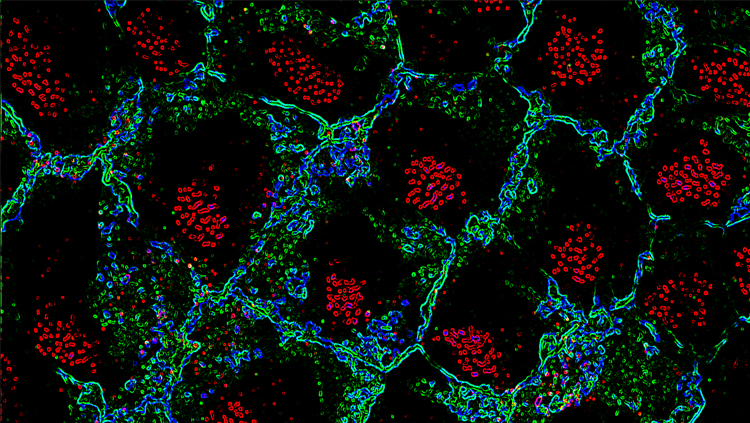
Message From the President
 Copyright Society for Neuroscience. All rights reserved.
Copyright Society for Neuroscience. All rights reserved.
We are incredibly fortunate. Neuroscience is arguably the most exciting field of biomedical research today, but that is no accident. Neuroscience emerged from foundational discoveries that depended on the integration of, and deep expertise in, several disciplines. The seminal research of Hodgkin and Huxley in the early 1950s and their quantitative model of the ionic basis of excitability depended on their integration of mathematics, physics, and physiology and the application of voltage-clamp technology. That scientific openness in neuroscience promotes the exchange of ideas and mirrors the core values of the founding members of SfN.
In the 50 years since the founding of the Society for Neuroscience, the field has advanced at a remarkable pace, and if history is the best predictor of the future — take a deep breath. In parallel, SfN has developed high-quality programing to promote training, funding, public engagement, advocacy, exchange of ideas, global partnerships, and rapid dissemination of discoveries. As we celebrate 50 years of SfN, we will also continue to communicate the work of the volunteer leadership and the investments made to fulfill the core missions of SfN — advance the understanding of the brain and nervous system; provide professional development, information, and education; promote public outreach; and inform legislators and policymakers about neuroscience research and discovery.
Quality Science
SfN’s Program Committee comprises 51 neuroscientists from across the world who represent the breadth of our field. They are an incredible group, led by Patricia Janak in collaboration with incoming chair Sheena Josselyn, who are responsible for the content of the annual meeting including abstract sessioning, selecting and inviting special lecturers, exploring creative ways to enhance the exchange of ideas, and much more. In 2018, the Program Committee introduced the Dual Perspectives session, which was standing room only, and ran the extremely popular Storytelling session for a second year. Strongly endorsed by SfN Council and Program Committee, SfN staff ensured that attendees to the annual meeting had access to high quality, enhanced infant-care facilities.
Under the leadership of our talented Editors-in-Chief Marina Picciotto and Christophe Bernard, and in collaboration with the Scientific Publications Committee and dedicated staff, the SfN journals JNeurosci and eNeuro continue to grow their readership. Publications from our journals are now regularly featured on the homepage of the Society’s website, and the weekly highlights to the press under embargo have resulted in SfN journals and the science we publish being featured in major news outlets worldwide. A new blog hosted by eNeuro regularly promotes scientific discourse on current topics in neuroscience, and an ongoing series of editorials from the JNeurosci editorial board have highlighted methods in scientific rigor specifically related to neuroscience. Further, the SfN Reviewer Mentoring program pairs trainees with editorial board members to open up the review process, provide training, and enhance the pool of skilled reviewers.
Supporting Neuroscientists
SfN’s elected Council — eight councilors, treasurers, secretaries, and presidents (elect, current and outgoing) — continue to focus on enhanced opportunities for the next generation of neuroscientists. In collaboration with the energetic committees for Neuroscience Training, Trainee Advisory, and Professional Development, we have invested substantial resources in year-round neuroscience training and professional development opportunities that extend beyond the annual meeting.
The Society hosted quarterly virtual conferences on current topics of optogenetics, implicit bias, neuroethology, and machine learning. Our partnership with the Federation of European Neuroscience Societies (FENS) also resulted in SfN member access to a European-based training webinar. We plan to expand these exchanges leading to additional content. A new grant funded by the National Institute of Neurological Disorders and Stroke (NINDS) provides resources to create a three-year training program on the sociology of science — addressing cultural factors that impact the rigor of neuroscience research. With support from the Dana Foundation, which matched SfN funds, SfN created the Leadership Development Program (LDP), a year-long professional development opportunity for exceptional trainees. SfN also worked toward developing a set of skills and curricula for undergraduate, graduate, and postdoctoral neuroscience programs relevant to SfN’s Institutional Program members.
The training resources are accessible through Neuronline, SfN’s learning and discussion website. Members can access all content, but SfN also gives open access to a significant portion of trainee material. With more than 1,000 pieces of content, enhancements are underway to improve discoverability of content on Neuronline.
Communicating Discoveries
A new editor-in-chief, Richard Wingate, and associate editor, Charles Yokoyama, took the helm at BrainFacts.org in January from John Morrison. BrainFacts.org, a public information initiative of the Kavli Foundation, the Gatsby Charitable Foundation, and SfN, has been an unqualified success, filling a need for trustworthy and authoritative information about neuroscience. Building on this success in FY 2019 includes expanding accessibility, increasing use by educators and the general public, and involving members of SfN on a more regular basis. BrainFacts.org has reached more than 10.5 million users across the world since its launch and creates a phenomenal opportunity for SfN to continue to offer the public insight into discoveries, explanations of current topics, and inspiration for even more students to study neuroscience.
Our continued focus on advocacy and communicating the critical importance of basic research to policymakers saw tangible outcomes this year, with both NIH and NSF receiving increases to their budgets in FY 2019. SfN worked in coalition with the science community to advocate for this investment in biomedical research funding. Fourty-eight neuroscientists attended Capitol Hill Day in the spring, and SfN collaborated with its international partners to develop culturally appropriate advocacy programs. Work with FENS focused on building support for the use of animals in biomedical research, and a renewed Memorandum of Understanding with the Canadian Association for Neuroscience led to an increased number of neuroscientists communicating with members of the Canadian Parliament. New this year, the Society is expanding its advocacy reach to neuroscience funding opportunities offered by the U.S. Department of Defense and Department of Veterans Affairs. The foundation of all these efforts remains our Society’s engaged NeuroAdvocates, including our public outreach committees. Their efforts — in the form of traveling to Capitol Hill, hosting lab tours, writing opinion pieces in their local papers, and more — share the value of our field to those who fund so much of our work. Alongside other organizations, SfN celebrated the 5th anniversary of the BRAIN Initiative, which has supported transformative science by our colleagues in tandem with large neuroscience initiatives around the globe.
50 Years and 50 More
SfN is a remarkable society because of the dedication of countless volunteer leaders, SfN staff, and our donors. In my year as president, I have had the great honor to help guide our organization’s efforts in 2019 and I am enormously grateful to work with so many amazing scientists who are giving back to the SfN community. We are members of a 50-year young Society that values a culture of openness, quality, and fairness. These values should not be taken for granted, they require the participation of you all to serve the community — visit a student’s poster, become a committee volunteer, present at a virtual conference, contribute to Neuronline, share your love of neuroscience with students and your community, advocate for neuroscience at the national or local level of government, or be a mentor. It took the collective contributions of many individuals to bring our Society to the threshold of success, and it will take even more to maintain the openness, quality, and fairness to remain current and significant. I hope you will contribute.






















